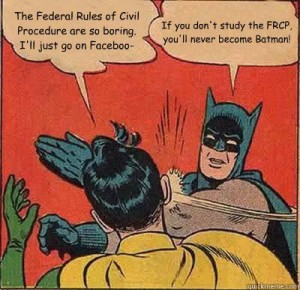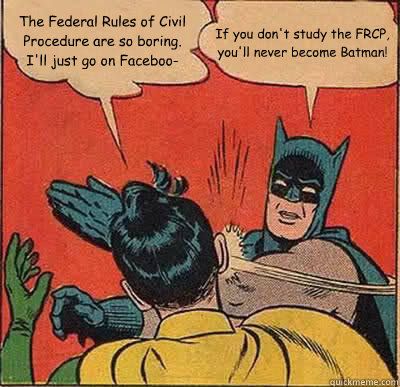 If you haven’t been paying attention, there are some fairly serious amendments to the Federal Rules of Civil Procedure (FRCP) that are going into effect on on December 1, 2015. The amendments, which apply to both new and existing civil actions pending in federal court, are an attempt to reduce costs and burdens of discovery. These amendments emerged from the 2010 Conference on Civil Litigation held by the Committee at the Duke Law School.
If you haven’t been paying attention, there are some fairly serious amendments to the Federal Rules of Civil Procedure (FRCP) that are going into effect on on December 1, 2015. The amendments, which apply to both new and existing civil actions pending in federal court, are an attempt to reduce costs and burdens of discovery. These amendments emerged from the 2010 Conference on Civil Litigation held by the Committee at the Duke Law School.
Perhaps the biggest change is to FRCP [26(b)(1)]:
(b) Discovery Scope and Limits.
(1) Scope in General. Unless otherwise limited by court order, the scope of discovery is as follows: Parties may obtain discovery regarding any nonprivileged matter that is relevant to any party’s claim or defense and proportional to the needs of the case, considering the importance of the issues at stake in the action, the amount in controversy, the parties’ relative access to relevant information, the parties’ resources, the importance of the discovery in resolving the issues, and whether the burden or expense of the proposed discovery outweighs its likely benefit. Information within this scope of discovery need not be admissible in evidence to be discoverable. — including the existence, description, nature, custody, condition, and location of any documents or other tangible things and the identity and location of persons who know of any discoverable matter. For good cause, the court may order discovery of any matter relevant to the subject matter involved in the action. Relevant information need not be admissible at the trial if the discovery appears reasonably calculated to lead to the discovery of admissible evidence. All discovery is subject to the limitations imposed by Rule 26(b)(2)(C).
(2) Limitations on Frequency and Extent.
* * *
(C) When Required. On motion or on its own, the court must limit the frequency or extent of discovery otherwise allowed by these rules or by local rule if it determines that: * * *
(iii) the burden or expense of the proposed discovery is outside the scope permitted by Rule 26(b)(1) outweighs its likely benefit, considering the needs of the case, the amount in controversy, the parties’ resources, the importance of the issues at stake in the action, and the importance of the discovery in resolving the issues.
Over at the Civil Procedure & Federal Courts Blog, Patricia Moore speculated that:
- They (these amendments) will make so-called “proportionality” an element defining the general scope of discovery, rather than a court-imposed limitation on discovery that is otherwise within the general scope.
- They will eliminate the court’s ability to broaden the general scope of discovery to “any matter relevant to the subject matter involved in the action.”
- They delete as “clutter” a statement, which has been in 26(b) since 1946 (although back then, it applied only to depositions), that the scope of permissible inquiry includes information about the existence and location of documents and the identity of witnesses; and
- They delete, as misunderstood, another phrase that has been in Rule 26(b) since 1946: that information sought in discovery does not need to be admissible in evidence if it “appears reasonably calculated to lead to the discovery of admissible evidence.”
One other significant change is to the “Safe Harbor Rule” – FRCP 37(e):
(e) Failure to Provide Preserve Electronically Stored Information. Absent exceptional circumstances, a court may not impose sanctions under these rules on a party for failing to provide electronically stored information lost as a result of the routine, good-faith operation of an electronic information system.If electronically stored information that should have been preserved in the anticipation or conduct of litigation is lost because a party failed to take reasonable steps to preserve it, and it cannot be restored or replaced through additional discovery, the court:
(1) upon finding prejudice to another party from loss of the information, may order measures no greater than necessary to cure the prejudice; or
(2) only upon finding that the party acted with the intent to deprive another party of the information’s use in the litigation may:
(A) presume that the lost information was unfavorable to the party;
(B) instruct the jury that it may or must presume the information was unfavorable to the party; or
(C) dismiss the action or enter a default judgment.
If you practice in federal court and haven’t been paying attention, you’ve got less than a month to get up to speed with things.
You can read the entire 2015 Civil Rules Package As Approved By the Judicial Conference here (PDF).














